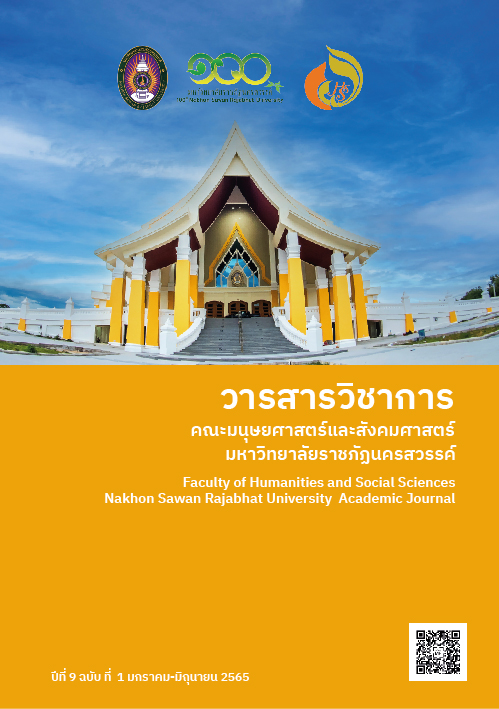Creative Research of The Apsornsaran Music Serieson Jazz Merge Style
Main Article Content
Abstract
This creative research is qualitative research with the following objectives: 1) to study the society and culture of Southern Isan in the context of Apsornsaran. 2) To create “The Apsornsaran Music Series on Jazz Merge Style” in contemporary jazz music. The population used in the research were 2 Southern Isan Folk Artists and 2 Southern Isan folk music experts. The research instrument was a semi-structured interview form presenting in the descriptive information and creative works.
The results showed that Southern Isan society and culture in the context of Apsararan which appears as a story that shows the value, meaning, and way of life of the Southern Isan people, through the 5 songs for the Apsararan dance performance. Which represents elegance, sweetness, and fun of the art of folk music in the south of the northeast, these are 1) Hae Hom 2) A Yai Lam Bae 3) Kaew Nor 4) Mong Kwon Jong Dai 5) Kajpaka.
The results of the creation of the Apsornsaran music series found 1) The songs appear on both major and minor pentatonic scales. 2) Keys and scales are changed using cadence as a tool. 3) The Skaul drum is clearly associated with the rhythm of the melody. 4) Appears monophony, polyphony, and homophony music texture in playing and arranging. 5) The Composition and melody of Kantrum harmoniously and beautifully harmonized with jazz music. 6) Southern Isan folk musicians can harmoniously play creative songs with jazz musicians under the agreement on the western music tunning systems established by the researcher.
Article Details

This work is licensed under a Creative Commons Attribution-NonCommercial-NoDerivatives 4.0 International License.
References
วิทยาลัยนาฏศิลปสุโขทัย. (2562). ระบำศรีสวายะ. วิทยาลัยนาฏศิลปสุโขทัย. สถาบันบัณฑิตพัฒนศิลป์.
เพชร ตุมกระวิล. (2548). ระบำขแมร์. บุรีรัมย์ : โรงพิมพ์วินัย, 2548
สุรพล สุวรรณ. (2560). มรดกทางวัฒนธรรม : สำนักดนตรีไทยบ้านพาทยโกศล. กองส่งเสริมวัฒนธรรม กระทรวงวัฒนธรรม.
สมศักดิ์ ศรีสันติสุข. (2558). โสวัฒนธรรมอีสานในงานวิจัย. ภาควิชาสังคมวิทยาและมานุษยวิทยา คณะสังคมศาสตร์ มหาวิทยาลัยเชียงใหม่.
สงัด ภูเขาทอง. (2532). การดนตรีไทยและทางเข้าสู่ดนตรีไทย. พิมพ์ครั้งที่ 1. กรุงเทพมหานคร : เรือนแก้วการพิมพ์.
ยศ สันตสมบัติ. (2544). มนุษย์กับวัฒนธรรม. กรุงเทพมหานคร : มหาวิทยาลัยธรรมศาสตร์.
รัตติยา มีเจริญ. (2557). วงกันตรึม คณะน้ำผึ้งสุรินทร์ : การปรับปรนและบทบาทหน้าที่. บัณฑิตวิทยาลัย มหาวิทยาลัยศรีนครินทรวิโรฒ. กรุงเทพฯ.
ภูมิจิตร เรืองเดช และคณะ. (2550). การละเล่นกันตรึม เพลงพื้นบ้านชาวไทยเขมรในจังหวัดบุรีรัมย์และจังหวัดสุรินทร์. สำนักงาน คณะกรรมการวัฒนธรรมแห่งชาติ กระทรวงวัฒนธรรม.
อุไร นาลิวันรัตน์. (2522). นางอัปสรในวรรณคดีสันสกฤต. กรุงเทพมหานคร: จุฬาลงกรณ์มหาวิทยาลัย.
อร่าม มุลาลินทร์ และคณะ. (2560). การศึกษาเพลงกันตรึมประยุกต์ของกลุ่มชาติพันธุ์ไทยเขมร. วารสารมนุษยศาสตร์และสังคมศาสตร์ ปีที่ 19 ฉบับที่ 2 (กรกฎาคม-ธันวาคม) ประจำปี 2560.
ณรงค์ชัย ปิฎกรัช. (2563). ทฤษฎีเพื่อการวิจัยและสารัตถบทดนตรี. ลพบุรี : โรงพิม์นาฎดุริยางค์.
ณัชชา โสคติยานุรักษ์. (2543). ทฤษฎีดนตรี. พิมพ์ครั้งที่ 2. กรุงเทพฯ: สำนักพิมพ์แห่งจุฬาลงกรณ์มหาวิทยาลัย.
Pearce, M., Wiggins, A. (2002). Aspects of a Cognitive Theory of Creativity in Musical Composition. Proceedings of the ECAI'02 Workshop on Creative Systems. IUFM.
กวี ครองแก้ว. (2547). การเรียบเรียงเสียงประสานสำหรับดนตรีแจ๊สและป๊อบปูลาร์. กำแพงเพชร: คณะมนุษยศาสตร์และสังคมศาสตร์ มหาวิทยาลัยราชภัฏกำแพงเพชร.
สมบัติ เวชกามา. (2549). ทฤษฎีดนตรีแจ๊ส. อุตรดิตถ์: โครงการตำราเฉลิมพระเกียรติเนื่องในวโรกาส ฉลองสิริราชสมบัติ 60 ปี. มหาวิทยาลัยราชภัฏอุตรดิตถ์.
เด่น อยู่ประเสริฐ. (2554). การประพันธ์ดนตรีแจ๊ส. วิทยาลัยดนตรี มหาวิทยาลัยรังสิต.
วิบูลย์ ตระกูลฮุ้น. (2561). ทฤษฎีดนตรีตะวันตก. กรุงเทพฯ: สำนักพิมพ์แห่งจุฬาลงกรณ์มหาวิทยาลัย.
วิบูลย์ ตระกูลฮุ้น. (2564). การประสานเสียงไดอะทอนิก. ปทุมธานี: สำนักพิมพ์อนันตนาค.
พระครูปลัดวิสันต์ สิริปัญฺโญ สัมภาษณ์เมื่อ 12 กุมภาพันธ์ 2564 ณ อำเภอเมืองสุรินทร์ จังหวัดสุรินทร์.
นางสำรวม ดีสม สัมภาษณ์เมื่อ 12 กุมภาพันธ์ 2564 ณ อำเภอเมืองสุรินทร์ จังหวัดสุรินทร์.
นายโฆษิต ดีสม สัมภาษณ์เมื่อ 12 กุมภาพันธ์ 2564 ณ อำเภอเมืองสุรินทร์ จังหวัดสุรินทร์.
นายอดิศักดิ์ ชมดี สัมภาษณ์เมื่อ 12 กุมภาพันธ์ 2564 ณ อำเภอเมืองสุรินทร์ จังหวัดสุรินทร์


